九年级英语课本讲解Unit 12
初中英语 人教九年级全一册 Unit12 过去完成时专项讲解 课件

the bell___h__a__d___ _r_u__n__g____.
2.B__e__fo__r_e_ I got to the bus stop,
had the bus ________ already
11
02
Unfortunately by the time I got to the bus stop, the bus had left.
12
03
When I got to the school gate, I realized I had left my homework at home.
13
__l_e_f_t______. 3. _W___h_e__n___ I got to school, I
realized that I _h__a__d____ __l_e_f_t____ my backpack at home.
8
Practice:
Read through the stroy quickly and find out the Past Perfect Tense and underline the sentencs.
Summary:(The Past Perfect Tense)
1. 过去完成时的构成:_h_a_d__+__过__去__分__词___ 2. 过去完成时表示:
过__去__某__一__时__刻__或__动__作__之__前__已__经__发__生__或____ 完__成__的__动__作__。________________________ 3. 过去完成时常与 _w__h_en_,_b_e_f_o_r_e_, _b_y_t_h_e_t_im__e_等引导的时间状 语连用。
人教版九年级英语unit12知识点归纳
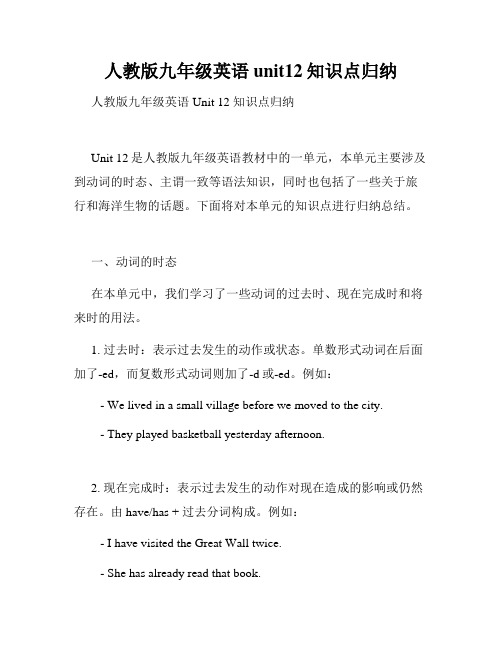
人教版九年级英语unit12知识点归纳人教版九年级英语Unit 12 知识点归纳Unit 12是人教版九年级英语教材中的一单元,本单元主要涉及到动词的时态、主谓一致等语法知识,同时也包括了一些关于旅行和海洋生物的话题。
下面将对本单元的知识点进行归纳总结。
一、动词的时态在本单元中,我们学习了一些动词的过去时、现在完成时和将来时的用法。
1. 过去时:表示过去发生的动作或状态。
单数形式动词在后面加了-ed,而复数形式动词则加了-d或-ed。
例如:- We lived in a small village before we moved to the city.- They played basketball yesterday afternoon.2. 现在完成时:表示过去发生的动作对现在造成的影响或仍然存在。
由have/has + 过去分词构成。
例如:- I have visited the Great Wall twice.- She has already read that book.3. 将来时:表示将来要发生的动作或存在的状态。
由will + 动词原形构成。
例如:- We will go to the beach tomorrow.- They will have a party next week.二、主谓一致主谓一致是指主语和谓语在人称和数上保持一致。
在本单元中,我们需要特别注意以下几点:1. 主语为第三人称单数时,谓语动词需要加-s或-es。
例如:- He often goes to the cinema on weekends.2. 表示时间、距离、金钱等的量词作主语时,谓语动词的单复数形式与它们代表的数量有关。
例如:- Ten yuan is enough to buy a drink.三、旅行话题在本单元中,我们学习了一些与旅行相关的词汇和句型,并通过对话的形式来进行实际应用。
九年级英语unit12知识点
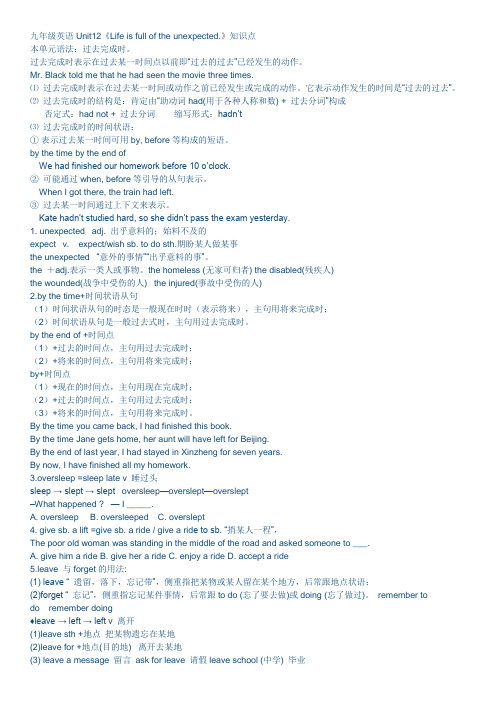
九年级英语Unit12《Life is full of the unexpected.》知识点本单元语法:过去完成时。
过去完成时表示在过去某一时间点以前即“过去的过去”已经发生的动作。
Mr. Black told me that he had seen the movie three times.⑴过去完成时表示在过去某一时间或动作之前已经发生或完成的动作。
它表示动作发生的时间是“过去的过去”。
⑵过去完成时的结构是:肯定由“助动词had(用于各种人称和数) + 过去分词”构成否定式:had not + 过去分词缩写形式:hadn’t⑶过去完成时的时间状语:①表示过去某一时间可用by, before等构成的短语。
by the time by the end ofWe had finished our homework before 10 o’clock.②可能通过when, before等引导的从句表示。
When I got there, the train had left.③过去某一时间通过上下文来表示。
Kate hadn’t studied hard, so she didn’t pass the exam yesterday.1. unexpected adj. 出乎意料的;始料不及的expect v. expect/wish sb. to do sth.期盼某人做某事the unexpected “意外的事情”“出乎意料的事”。
the +adj.表示一类人或事物。
the homeless (无家可归者) the disabled(残疾人)the wounded(战争中受伤的人) the injured(事故中受伤的人)2.by the time+时间状语从句(1)时间状语从句的时态是一般现在时时(表示将来),主句用将来完成时;(2)时间状语从句是一般过去式时,主句用过去完成时。
by the end of +时间点(1)+过去的时间点,主句用过去完成时;(2)+将来的时间点,主句用将来完成时;by+时间点(1)+现在的时间点,主句用现在完成时;(2)+过去的时间点,主句用过去完成时;(3)+将来的时间点,主句用将来完成时。
人教版九年级英语第12单元知识讲解
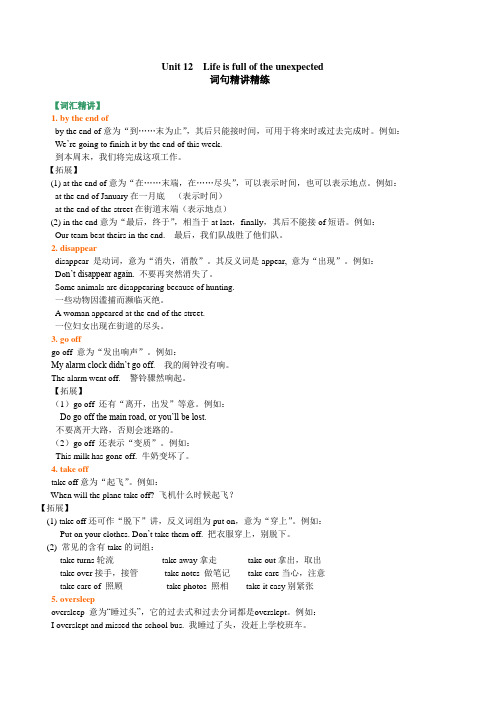
Unit 12 Life is full of the unexpected词句精讲精练【词汇精讲】1. by the end ofby the end of意为“到……末为止”,其后只能接时间,可用于将来时或过去完成时。
例如:We’re going to finish it by the end of this week.到本周末,我们将完成这项工作。
【拓展】(1) at the end of意为“在……末端,在……尽头”,可以表示时间,也可以表示地点。
例如:at the end of January在一月底(表示时间)at the end of the street在街道末端(表示地点)(2) in the end意为“最后,终于”,相当于at last,finally,其后不能接of短语。
例如:Our team beat theirs in the end.最后,我们队战胜了他们队。
2. disappeardisappear 是动词,意为“消失,消散”。
其反义词是appear, 意为“出现”。
例如:Do n’t disappear again. 不要再突然消失了。
Some animals are disappearing because of hunting.一些动物因滥捕而濒临灭绝。
A woman appeared at the end of the street.一位妇女出现在街道的尽头。
3. go offgo off 意为“发出响声”。
例如:My alarm clock didn’t go off. 我的闹钟没有响。
The alarm went off. 警铃骤然响起。
【拓展】(1)go off 还有“离开,出发”等意。
例如:Do go off the main road, or you’ll be lost.不要离开大路,否则会迷路的。
(2)go off 还表示“变质”。
例如:This milk has gone off. 牛奶变坏了。
人教版九年级英语课件:Unit12(共49张PPT)
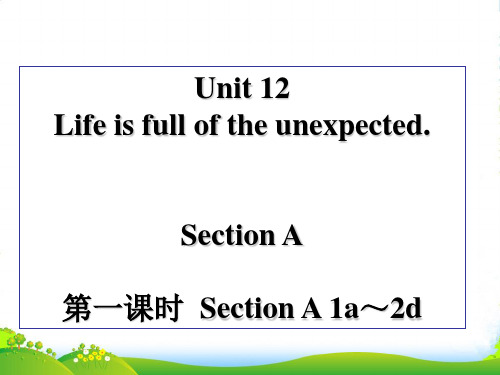
2. As I was waiting in line with other office workers, I
heard a loud sound. 当我正在和其他办公室职员排队时,我听到了一声巨响。 as意为“当……的时候”,as可表示主句和从句的动作 同时发生或同时持续,引导时间状语从句。 如:As years go by, China is getting richer and stronger. 随着时间一年一年地过去,中国变得越来越富强了。
A. begins B. begin C. beginning D. have begun ( C)(2)I ____ do my homework when my father came in.
A. am going to B. was going C. was about to D. am about to
课堂同步
一、阅读课本第90页2d,回答问题。 1. Why was Kevin late for class? _B__e_ca_u_s_e_h_i_s_a_l_a_rm__c_l_o_c_k_d_i_d_n_’t_g_o__o_ff_._________ 2. Did he eat breakfast? _N__o_, _h_e_d_i_d_n_’t_.____________________________ 二、阅读课本第90页2d,选择正确答案。 (C )1. What time did Kevin wake up?
课文导学
人教版英语九年级上册Unit12 知识点详解
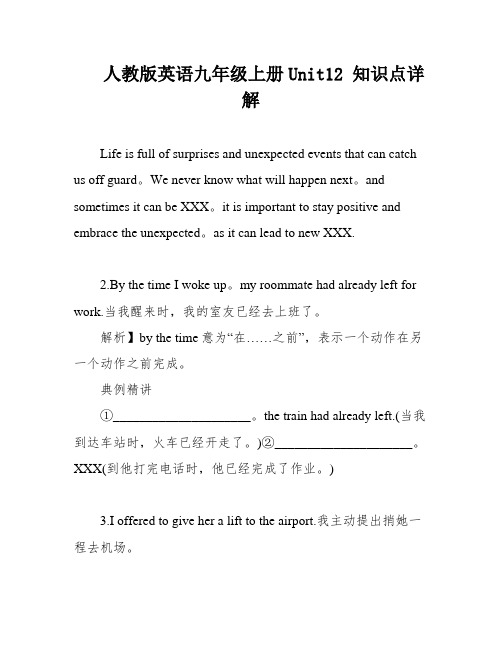
人教版英语九年级上册Unit12 知识点详解Life is full of surprises and unexpected events that can catch us off guard。
We never know what will happen next。
and sometimes it can be XXX。
it is important to stay positive and embrace the unexpected。
as it can lead to new XXX.2.By the time I woke up。
my roommate had already left for work.当我醒来时,我的室友已经去上班了。
解析】by the time意为“在……之前”,表示一个动作在另一个动作之前完成。
典例精讲①_____________________。
the train had already left.(当我到达车站时,火车已经开走了。
)②_____________________。
XXX(到他打完电话时,他已经完成了作业。
)3.I offered to give her a lift to the airport.我主动提出捎她一程去机场。
解析】give…a lift意为“捎(某人)一程”,表示主动提供搭载某人的服务。
典例精讲①Can you _________________________to the train n。
(你能开车送我去火车站吗?)②I___________________________to the supermarket。
(我主动提出开车送她去超市。
)4.The alarm clock went off。
and I rushed out of bed.闹钟响了,我立刻从床上跳起来。
解析】go off意为“响铃”,表示闹钟、警报等声音的响起。
典例精讲①The fire alarm _________________________。
人教版英语九年级全册Unit 12知识点详解及练习
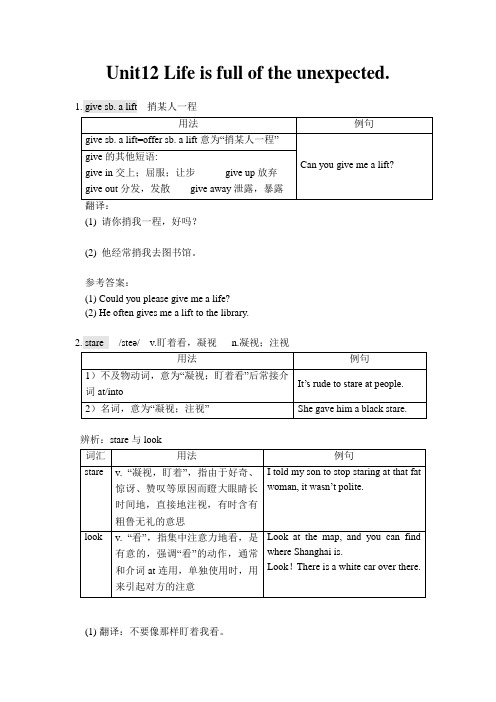
Unit12 Life is full of the unexpected.1. give sb. a lift 捎某人一程(1) 请你捎我一程,好吗?_______________________________________________________________ (2) 他经常捎我去图书馆。
_______________________________________________________________ 参考答案:(1) Could you please give me a life?(2) He often gives me a lift to the library.2. stare /steə/ v.盯着看,凝视n.凝视;注视辨析:stare与look(1)翻译:不要像那样盯着我看。
___________________________________________________________________ (2) Emily ____ the young man hard and finally shamed him into giving up his seatto the old lady.A. stared onB. stared atC. stared forD. stared with参考答案:(1) Don’t stare at me like that.(2) B3. above /əˈbʌv/ prep.在...上面adv.在上面辨析:above,on与over选词填空:above/on/over(1)The plane is flying _____ the clouds.(2)There are five books _____ the desk.(3)There is a bridge _____ the river.(4)I hope the price of the dress will not be____$20.参考答案:(1)above (2)on (3)over (4)above4. burn /bɜ:n/ v.着火;燃烧burn--burnt / burned--burnt / burned辨析:burn, burned与burning(1)翻译:燃烧的旅馆位于城市中心。
Unit 12教材思路分析人教版九年级英语全册

Unit 12 Life is full of the unexpected. 教学目标与要求一、话题Topic:难以预料的事情(Unexpected events)二、功能Functions:能讲述过去发生的事情(Narrate past events)When I woke up, it was already 8:00 a.m.Before l got to the bus stop, the bus had already left.As I was waiting in line with the other office workers, I heard a loud sound.By the time I got to the airport, my plane to New Zealand had already taken off.三、语法Grammar:1. 了解过去完成时(Past perfect tense)2. 语法复习(Review of key structures)能正确使用由when, before, as, by the time引导的时间状语从句表达过去发生的事情When I got to school, I realized that I had left my backpack at home.By the time I got back to school, the bell had rung.Before I got to the bus stop, the bus had already left.As I was waiting in line with the other office workers, I heard a loud sound.四、词汇和常用表达Words & expressions:1. 能正确使用以下词汇(Curriculum words)backpack, block, worker, airport, cream, pie, bean, market, fool, discovery, lady, officer, oversleep, ring, burn, cancel, disappear, unexpected, alive, believable, above, till, west2. 能正确使用以下常用表达(Useful expressions)by the time, give…a lift, in line with, show up, by the end of, costume party, sell out 3. 能认读下列词汇(Non-curriculum words)stare, disbelief, burning, workday, costume, embarrassed, announce, spaghetti, hoax, embarrassing, New Zealand, Italy, Mars五、学习策略Strategies:1. 利用本单元听力图片信息,预测听力内容2. 根据语篇中的段落首句,激活相关背景知识,预测文章内容六、文化知识Culture:了解国外愚人节风俗SECTION A 内容介绍Section A的中心话题是讲述发生过的意想不到的事情,涉及以下两个主要语言项目:●了解过去完成时态描述过去某一时间或动作之前已经发生或完成了的动作;●运用一般过去时态描述过去某个时间里发生的动作或存在的状态。
- 1、下载文档前请自行甄别文档内容的完整性,平台不提供额外的编辑、内容补充、找答案等附加服务。
- 2、"仅部分预览"的文档,不可在线预览部分如存在完整性等问题,可反馈申请退款(可完整预览的文档不适用该条件!)。
- 3、如文档侵犯您的权益,请联系客服反馈,我们会尽快为您处理(人工客服工作时间:9:00-18:30)。
九年级英语课本讲解Unit 121. be supposed to do .应该We are supposed to stop smoking. 我们应该停止吸烟。
知识拓展表示应该的词有:should, ought to ,be supposed to2. shake hands握手shake 本意是“摇动、震动”3. You should have asked what you were supposed to wear.你本应该问清楚怎么样穿才得体。
中的“should have asked”是“情态动词+现在完成时”表示过去本应该做某事,事实上没有做如:She should have gone to Beijing. 她本应该去了北京。
(没有去)4. be relaxed about sth.对某事随意、不严格如:They are relaxed about the time. 他们对时间很随意。
5. pretty adv. 相当,很=very She is pretty friendly. 她相当友好。
adj. 美丽的She is a pretty girl.她是一个美丽的女孩。
6. make plans to do == plan to do. 打算做某事如:She has made plans to go to Beijing.==She has planed to go to Beijing.7. drop by 访问看望拜访串门We just dropped by our friends’ homes.我们刚刚去朋友家串门。
8. on time按时/准时in time及时9.after all 毕竟终究You see I was right after all.你看,毕竟还是我对了。
10. invite sb. to do sth. 邀请某人做某事Lily invited me to have dinner.莉莉请我吃晚饭。
11. without 没有12. around the world == all over the world 全世界13. pick up 捡起挑选如:He picked up his hat. 他捡起他的帽子。
14. start doing == start to do 开始做某事He started reading.== He started to read. 他开始读。
15. point at 指向16. stick v. 剌截n. 棒,棍chopstick 筷子是由chop(砍)+stick(棒)合成,通常用复数形式:chopsticks17. go out of one’s way to do 特意/专门做某事He went out of his way to make me happy.他特意使我高兴。
18. make mistakes 犯错误(复数)make a mistake 犯错误(一个)19. be different from 与…不同Chinese food is different from theirs. 中国菜与他们的不同.20.get/be used to sth./ doing习惯于… be used to do 被用于做… be used for doing被用于做…used to do 过去常常做…I wash clothes eve ryday. But I’m used to it.我每天都洗衣服,但我习惯了I am used to washing clothes. 我习惯于洗衣服了。
The knives are used to cut things. 小刀被用来切东西。
The knives are used for cutting things. 小刀被用来切东西。
She used to watch TV after school. 她过去放学后常常看电视。
21. 我发现要记住每一样事是困难的。
I find it difficult to remember everything.形式宾语真正宾语常见的形式宾语有:find / think + it/them +形容词to do sth. I think it hard to study English.22. cut up 切开切碎Let’s cut up the water melon.让我们切开这个西瓜吧。
23. make a toast 敬酒24. crowd v.挤满其形容词和过去式及过去分词都是:crowded25. set n. 一套v. 设置26. can’t stop doing 忍不住做某事I can’t stop laughing. 我忍不住笑27. make faces做鬼脸28.face to face 面对面29. learn…by oneself 自学I learn English by my self. 我自学英语。
Ⅰ.单项选择( )1.It is not polite to get into a room without _______ first.A knockingB to knockC knockedD knock( )2.Mr Brown ________ the train station ______ three o’clock in the afternoon.A took; atB arrived; inC reached; inD got to; at( )3.They are used to _______ in suburbs(郊外). A live B lived C living D stay( )4.There is a book on the floor. Please _______. A pick it B pick it up C pick up it D put away it( )5.We go to school ______ foot and eat meals ______ chopsticks.A by; byB with; byC on; withD on; use( )6.You aren’t supposed to eat or drink while _______ down the street.A to walkB walkingC walksD walked( )7. Paul doesn’t have to be made ____. He always works hard. A. learn B. to learn C. learning D. learned ( )8.The key is used to _______ the door. A locking B lock C locked D locks( )9.Jim’s father is used to _______ in China. A working B work C works D worked( )10.Mrs. Black _____ be a doctor, so she _______ others.A used to; is used toB is used to; used toC used to; used toD is used to; is used to( )11.She _________ each of the guests as they came through the door.A put upB exchangedC greetedD wiped( )12.He kept on _____ his eyes with the back of his hand. A wiping B to wipe C washing D to wash ( )13.The math problem is ______ hard, I need _______ time.A a bit; a bitB a bit of; a bitC a little; a little ofD a little; a little( )14.There is ______ time for us ______ finish the work. A much to B enough to C so that D such that ( )15.It’s very kind _____ her ______ after the old man.A for; to lookB for; lookC of; to lookD of; look( )16.------What happened to him ? -------- He fell off the bike . He _________ careful at first.A should beB must beC should have beenD must have been( ) 17. --- Will you come to the dinner party? --- I will not come until Jenny __________.A. will be invitedB. can be invitedC. invitedD. is invited( ) 18. John _______ Beijing the day before yesterday.A. arrived atB. arrivedC. reached toD. arrived in( ) 19.In Switzerland, people ________ visit a friend’s house.A. make plansB. make plans toC. makes plans toD. make a plan( ) 20. It’s too hot. Do you mind ______ the window?A. my closingB. my openingC. openD. close( ) 21.She ______Shanghai next week.A. is leaving forB. leaves forC. leavedD. left( ) 22.What are you nervous _____, Mary? A. in B. at C. on D. about( ) 23.We go to school every day _____ Saturday and Sunday. A. beside B. besides C. except D. except for ( ) 24.Yang Liwei is proud ____ his motherland. A. in B. of C. from D. for( ) 25. I find _____ difficult to remember everything, though I’m still young. A. that B. this C. it D. what( )26.He _____ at the last party. He felt sorry for it.A. makes some mistakesB. make a mistakeC. made few mistakesD. made many mistakes( )27. ---Is it easy for people from different countries to greet each other?--- I don’t think so. Because different countries have different _______.A. clothesB. foodC. wayD. customs( )28. --- What ______ you ____ to your teacher if you are not on time?--- I think we do the same as you do.A. do, tellB. do, sayC. will, sayD. will, tell( )29. Linda is new here. But she soon ________ getting up early.A. get used toB. is used toC. used toD. uses to( )30. Your son was supposed here an hour ago. A. to be B. to coming C. arrive D. to goII.完型填空Once an Arab was travelling in the desert. When the sun went down in the west, he stopped and 1 his tent, made a fire and had a simple meal. When night fell, he 2 down to sleep.He had already fallen aslep when he felt a soft 3 on his elbow. He woke up to find that his camel had put his head inside the tent. The camel said, “Would you pleas let me 4 my head in the tent to get warm It’s so cold outside. I won’t take up too much 5 .The Arab was a kind-hearted man.“All right,do as you 6 ,”he said.Then he turned on his side and back to sleep.It wasn’t long 7 he felt a push on his shoulder. It was the camel again. “Dear master,” the camel said, “ my head is quite warm now, but my neck is still cold. Do you mind 8 I keep it ins ide the tent, too?”“No, not at all,” the man said. But this time he felt a bit 9 , as the camel had such a long neck.No sooner had cloesed his eyes 10 he got a harder push in his side. This time the camel said, “Will you please allow me to bring m y front legs inside and warm them up a little?”The Arab 11 over to one side of the tent. He made himself as small as he could. It wasn’t 12 cofortable, and sleep was now out of the question.Soon after that the camel gave him a rough push and said, “The tent is too small for the two of us. 13 , my two back legs are still left in the cold. It is only 14 that you should leave the whole tent to me.”And with that, the camel 15 the poor man out.( )1. A. built B. made C. put up D. set( )2. A. laid B. lay C. lied D. went( )3. A. touch B. beat C. kick D. bite( )4. A. hold B. place C. keep D. reach( )5. A. place B. tent C. room D. blanket( )6. A. please B. alike C. are like D. want( )7. A. after B. before C. since D. then( )8. A. whether B. as C. that D.if( )9. A. crowded B. comfortable C. warmer D. narrower( )10. A. than B. then C. when D. after( )11. A. went B. walked C. climbed D. moved( )12. A. very B. much C. a bit D. a little( )13. A.Except B. Besides C. After all D. But( )14. A.bad B. wrong C. sorry D. right( )15. A.pulled B. touched C. kicked D. letIII.阅读理解(A)Tony: These days, the word “clone” has been seen very often in the newspapers. Do you know its meaning?Lana: I read a report. It said that Dr. Ian Wilmut successfully cloned a lamb named Dolly from a grown-up sheep. So people call him the “father” of Dolly.Tony: In fact, the word “clone” means to produce the “same” animal by taking cells from a grown-up one. I think, if we know how to do cloning, we need only to keep a small number of sheep, cows or horses.Lana: What’s more, these days some peopl e even want to clone humans. They have asked: Can we clone ourselves?Tony: It seems interesting. But do you think it possible to do that?Lana: No, impossible! First, I think we cannot clone a dead person, because the cells in his body are dead already.Tony: Then can we clone a living person?Lana: Again no! You might clone yourself one after another, but it is only a copy, not a real you. It is only something, not a “human”.Tony: Well, you mean that it is not a real human.Lana: True enough! I think Dr. Wilmut would most like to make better animals, and it has nothing to do with human cloning.( )1. The word “clone” means ___________.A. to give birth to a new lifeB. to make a new thing according to the sampleC. to make a new animalD. to make a new living thing by taking cells from an old one( )2. Dolly was the name of _________.A. the father of a sheepB. a famous scientistC. a sheep that was clonedD. a grown-up sheep( )3. Lana says Dr. Ian Wilmut is the “father” of Dolly. Here, she means _______.A.Dr. Ian Wilmut gave Dolly a new lifeB. Dr. Ian Wilmut was the first man to clone a sheep in his labC. Dr. Ian Wilmut takes care of Dolly like a fatherD. Dr. Ian Wilmut has a daughter whose name is Dolly( )4. What are Tony and Lana talking about? They are talking about _________.A. a newspaperB. sheepC. Cloning techniqueD. humans( )5. According to the text, which of the following is TRUE?A. Scientists have successfully cloned humans.B. Dr. Wilmut likes to do human cloning.C. Cloned animals are better than grown-up ones.D. Lana thinks humans shouldn’t be cloned.(B)When Martin was a little boy, he lived in the town of Holtham. At the time, Martin thought that the little town was a very big town.Well, Martin came back to Holtham last night. “It’s a small town!” he said to himself.The town has changed very little in the past forty years. But Martin has changed a lot. He has grown into a man. His ideas are a man’s eyes.Martin stayed in the town for five hours. He walked from street to street, but he knew nobody. Who were the strangers, the people in Holtham or Martin? Martin suddenly understood it all. Not the people in the town but he.( ) 1. Holtham was ______________.A. a little countryB. a small townC. a big townD. a big country( ) 2. Martin left the town __________.A. when he was 40B. 40 years agoC. 14 years agoD. 5 hours ago( ) 3. During his five hours’ stay in the town, Martin __________.A. met no friendB. didn’t want to see his friendsC. saw nobodyD. saw a lot of friends( ) 4. Which of the following is true? __________.A. Martin has never lived in the townB. Holtham was a town of strangersC. There have been great changes in the townD. A man’s ideas are different from a child’s( ) 5. Now Martin sees things through ________________.A. a boy’s eyesB. a child’s eyesC. a man’s eyesD. a stranger’s eyes(C)There are students from all over the world at the United World School. In this school these students study and spend their free time together. The school believes this will help them grow up to be knowledgeable, caring and friendly.Once a year, there is a special “United Nations” show. Students are allowed to show anything they want, but anything that comes from their traditional cultures. To get ready for the festival, they have to teach each other. And the school believes this will help them understand and enjoy the culture of their friends better.This school also believes that students should be allowed to make some decisions themselves. For example, the older students are allowed to wear what they want and the younger students are allowed to choose which kind of uniform they want to wear. But all students are asked not to wear an expensive necklace or something else like that, and not to wear clothes that will make other students unhappy.It is never possible to make everybody happy, but if we want to have a much more wonderful world, it is important for students to understand and enjoy other cultures as well as to be proud of their own.( )1. Where do the students at the United World School come from? _____A. ChinaB. AmericaC. CanadaD. All over the world( )2. What are the students allowed to do at the United World School? _______A. To do everything they wantB. To wear anything they wantC. To decide something themselvesD. To choose anything they want( )3. Which of the following is NOT right according to the passage? _________.A.The school can help the students grow up to be friendlyB.The school allows the students to make some decisionsC.We can make everybody happy by understanding each otherD.It’s important to help the students understand other cultures.( )4. What can Li Lei, a Chinese boy, show on the festival according to the passage? ________A.Play the pianoB.Act Beijing OperaC.Sing an English songD. Have a rock show( )5. What does “this” in the passage? ___________A.The “United Nations” showB.The traditional cultureC.The schoolD.The world(D)Now satellites are helping to forecast(预报)the weather. They are in space, and they can reach any part of the world. The satellites take pictures of the atmosphere(大气), because this is where the weather forms(形成). They send these pictures to the weather stations. So meteorologists(气象学家)can see the weather of any part of the world. From the pictures, the scientists can often say how the weather will change.Today, nearly five hundred weather stations in sixty countries receive satellite pictures. When they receive new pictures, the meteorologists compare(比较)them with earlier ones. Perhaps they may find that the clouds have changed during the lastfew hours. This may mean that the weather on the ground may soon change, too. In their next weather forecast, the meteorologists can say this.So the weather satellites are a great help to the meteorologists. Before satellites were invented, the scientists could forecast the weather for about 24 or 48 hours. Now they can make good forecasts for three or five days. Soon, perhaps, they may be able to forecast the weather for a week or more ahead(提前).( )1. Satellites travel_____. A. in space B. in the atmosphere C. above the ground D. above space( )2. Why do we use the weather satellites to take pictures of the atmosphere? Because __________.A. the weather satellites can do it easilyB. clouds form thereC. the weather forms thereD. the pictures can forecast the weather( )3. Meteorologists forecast the weather __________.A.when they have received satellite picturesB.after they have compared new satellite pictures with earlier onesC. before they received satellite picturesD. during they study satellite pictures( )4. Maybe we’ll soon be able to forecast the weather for ________.A. one dayB. two daysC. five daysD. seven days or even longer( )5. The main(主要的)idea of this passage is that satellites are now used in _________.A. taking pictures of the atmosphereB. receiving pictures of the atmosphereC. doing other work in many waysD. weather forecastingIV.根据句意和中文意思或所给词,写出正确的单词。
